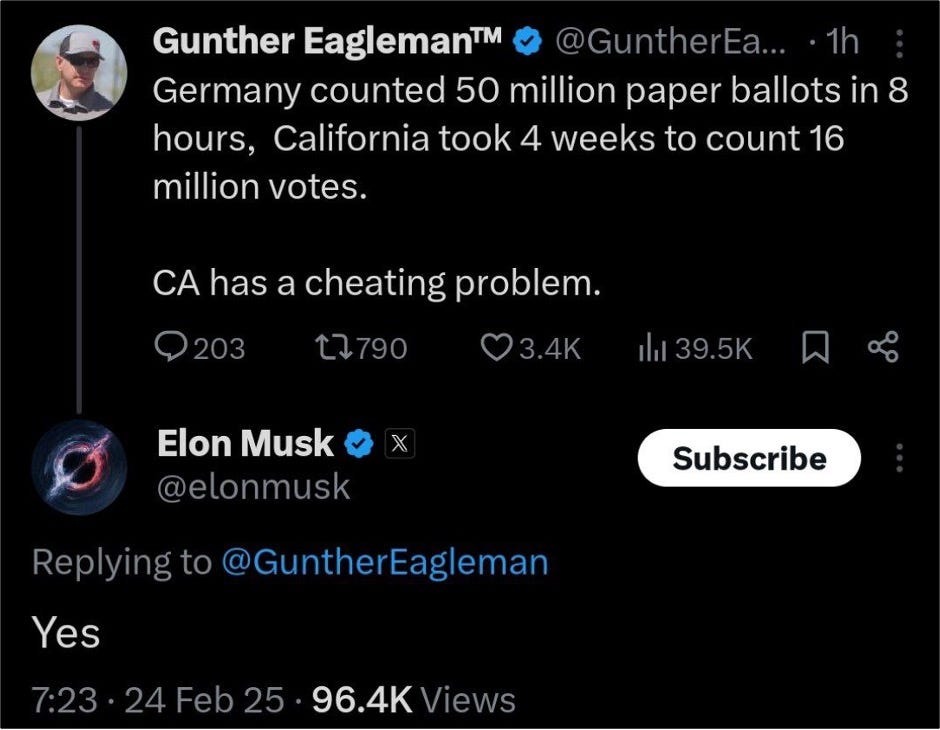Germany, Katie Hobbs, and the "Blue Wall" Prove America is Redder than Advertised
Germany showed the world tens of millions of ballots can be counted in a single day without the world ending. Consider the actions of Arizona's faux Governor and the Blue Wall to see the truth.
A few years before fate pushed me into the fiercest part of the information war over America’s elections, I took a job in Houston selling traffic control devices. These devices were cored into the pavement and detected metal rolling over them, which in practically every case at a signalized intersection, indicates the presence of a vehicle seeking to pass through the intersection.
Every intersection in your city or county, after initial construction, is almost always maintained either by that city or county, or by your state’s Department of Transportation. While they may procure different detection devices than those sold by me in those days, such as radar, video, or traditional wire loops, the purpose of placing detection at a traffic signal is to expedite the flow of traffic and cycle the phases according to which approaches are receiving traffic in real time. If you’ve ever found yourself at an empty intersection at 2 a.m. wondering why you can’t get a green arrow to turn left, then you’ve just found out by reading this that the signal in question must be poorly maintained and in need of working and accurate detection devices.
You may be wondering – who cares? Don’t forget, I always have a point to make when I wander a bit. The most serious consequence of not having the signals operate based on demand, and leaving people sitting at red lights, is the risk and expectation that drivers will grow impatient with the inefficient signals and run the red lights. Given that most fatal accidents are at intersections, this creates major risk for the citizenry and liability for the agency in charge of the signal. Therefore, it behooves the controlling agency to streamline signals and make them as efficient as possible.
Likewise, given that the Constitutional Republic we live in is only as strong as the belief the people hold that the government is of, by, and for the people, and therefore subject to the demands (the vote) of the people, we will not be able to preserve the nation under its current government composition unless the people can trust the government’s processes are efficient, effective, and free of corruption. No process, not even the now-exposed levers of spending, is less trusted than our embarrassingly bad systems of election administration.
Germany
Gunther Eagleman posted the following on X this morning, which received an affirmative “Yes” from Elon Musk as a comment:
Germany counted 50 million paper ballots in 8 hours, California took 4 weeks to count 16 million votes.
CA has a cheating problem.
Eagleman’s post is generously shallow. I’m not writing this section to slice and dice Germany’s election systems for examples we should replicate; however, I am bringing it up not only because it just happened yesterday, but because it serves as a prime example of a direct address to a critical problem that is successfully being replicated elsewhere. We can find examples just like Germany’s in the United Kingdom and France, just among regional peers.
We can even find examples inside the United States, in which Florida has three times the population of Arizona, but finishes nearly all of its vote counting (enough to call almost every race, even down to the municipal levels) on Election Night, while Arizona rambles on for two weeks to count votes in a state in which two counties cast three-quarters of the statewide ballot total. Arizona election apologists like Stephen Richer and Adrian Fontes, two friends who act like public rivals, blame this inefficiency on “the law” and subsequently hide behind it while the citizens of the state itself pack legislative chambers and county commissioner meetings with increasing fury over the inaction.
Katie Hobbs
Alright, so you’re telling me, now that we know counting can be sped up, which will increase public trust in election outcomes, all we must do is get the law changed and we will make sure this problem gets fixed, right?
Wrong.
Last week, Arizona’s dubiously “elected” Governor, Katie Hobbs, vetoed HB2703, which passed through both Republican-held legislative chambers as a direct address to something every politically engaged Arizonan can agree is a disaster of epic proportions (the fact that elections take two weeks to wrap up in a mid-sized state). Some referred to this bill as the “Florida-style” elections bill, which not only revamped procedures to provide results on Election Night, but after a hard internal fight, dug deep into the root of the corruption, which is the bloated voter rolls. You can read more about the voter roll bloat in my article about Maricopa County Recorder Justin Heap here.
Arizona operates as close to the two factors that guarantee near-automatic blue state status as possible without officially operating under them. First, there is a robust motor voter system in place in Arizona, although the process is not technically automatic because citizens are asked if they would like to register when they visit the DMV, normally to get a driver license or have an old one updated. Second, all 15 Arizona counties operate under the Active Early Voting List (AEVL), a permanent roster in which those signing up (about three-quarters of Maricopa Republicans are on it) automatically receive a mail-in ballot for any election without needing to request it first, which is the next best thing to Universal Mail-In Balloting if you’re a Democrat.
Keep reading with a 7-day free trial
Subscribe to Captain K's Corner to keep reading this post and get 7 days of free access to the full post archives.




